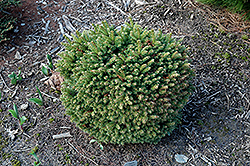It's all about ...
plants

Witches Brood Norway Spruce
Picea abies 'Witches Brood'
Height: 7 feet
Spread: 5 feet
Sunlight:
![]()
![]()
Hardiness Zone: 3a
Other Names: Norwegian Spruce
Description:
Fresh green needles and a dense habit make this slow growing dwarf evergreen a great choice for the garden or border; features a broad conical shape at maturity, with fine narrow foliage; a superior choice for its vigor and hardiness
Ornamental Features
Witches Brood Norway Spruce is a dwarf conifer which is primarily valued in the landscape or garden for its distinctively pyramidal habit of growth. It has rich green evergreen foliage which emerges light green in spring. The small needles remain green throughout the winter.
Landscape Attributes
Witches Brood Norway Spruce is a dense multi-stemmed evergreen shrub with a distinctive and refined pyramidal form. It lends an extremely fine and delicate texture to the landscape composition which can make it a great accent feature on this basis alone.
This is a relatively low maintenance shrub. When pruning is necessary, it is recommended to only trim back the new growth of the current season, other than to remove any dieback. Deer don't particularly care for this plant and will usually leave it alone in favor of tastier treats. It has no significant negative characteristics.
Witches Brood Norway Spruce is recommended for the following landscape applications;
- Mass Planting
- Hedges/Screening
- General Garden Use
Planting & Growing
Witches Brood Norway Spruce will grow to be about 7 feet tall at maturity, with a spread of 5 feet. It tends to fill out right to the ground and therefore doesn't necessarily require facer plants in front, and is suitable for planting under power lines. It grows at a slow rate, and under ideal conditions can be expected to live for 50 years or more.
This shrub does best in full sun to partial shade. It does best in average to evenly moist conditions, but will not tolerate standing water. It is not particular as to soil type or pH, and is able to handle environmental salt. It is highly tolerant of urban pollution and will even thrive in inner city environments. This is a selected variety of a species not originally from North America.
